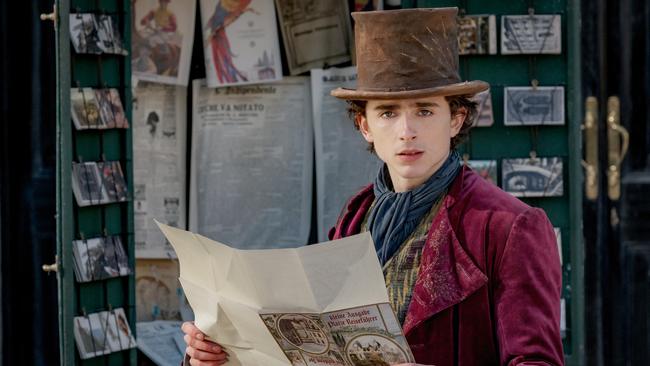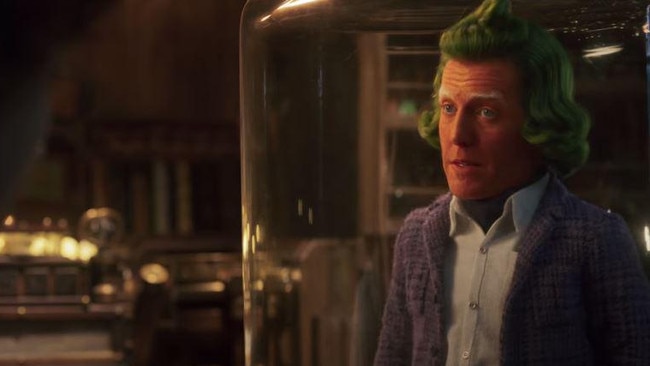Wilder? Not this wily Wonka
The third film adaptation of his 1964 novel Charlie and the Chocolate Factory is a sugar-coated one, perfect for the Christmas holiday PG audience.

Wonka
In Cinemas December 8
★★★½
Is Roald Dahl (1916-1990) rolling in his grave in response to Wonka, the third film adaptation of his 1964 novel Charlie and the Chocolate Factory? Probably. That’s not a criticism, however. The British author was a hard man to please.
This 116-minute movie is a high-energy, visually spectacular, entertaining, feel-good origin story of Willy Wonka, the battered top hat-wearing chocolatier we know as Gene Wilder in Willy Wonka & the Chocolate Factory (1971), which Dahl hated, and Johnny Depp in Charlie and the Chocolate Factory (2005).
This time around he’s the irresistible Timothee Chalamet, who, like Mary Tyler Moore for an older generation, could turn the world on with his smile. He’s supported by a fine ensemble cast that includes Oscar winner Olivia Colman, Rowan Atkinson, Matt Lucas from Little Britain and Hugh Grant as you have not seen him before.
Genre-wise, this is a musical fantasy. Chalamet has a decent voice and while his footwork is not up with Ryan Gosling’s in La La Land (2016), that’s a high bar to measure anyone by. The song and dance routines burst with colour, bounce and, above all, cheerfulness (credit to cinematographer Chun-Hoon Chung). The opening number is Chalamet singing A Hatful of Dreams, one of several new songs written for the movie by Neil Hannon, lead singer of the Northern Ireland pop band The Divine Comedy. “Here’s my destiny, I just need to unlock it/ Will I crash and burn or go up like a rocket?/ I got nothing to offer but my chocolate/ And a hatful of dreams.”
The uplifting soundtrack is indicative of how British director Paul King (Paddington Bear from 2014 and its 2017 sequel) wipes the dark from the Dahl. One of the original songs, Pure Imagination, is all sweetness and light, stripped of the sadness and suppressed loathing Wilder brought to it. All of this is fair enough as this story is not drawn line by line from Dahl’s books. He created Willy Wonka but not this version: an illiterate, starry-eyed young man who arrives in a pre-war European city (a mix of Paris and London) with dreams of opening the greatest chocolate shop in the world.
This Wonka comes from the minds of King and his co-writer Simon Farnaby, who has a terrific cameo as a zoo guard. How this mid-20s accentuate-the-positive optimist, who loves his missing perhaps dead mother (Sally Hawkins in flashback scenes), and only wants to bring kindness to others, becomes an enigmatic, somewhat misanthropic middle-aged tycoon is a question that might be answered in a sequel.
Depp, for what it’s worth, said one inspiration for his creepy, pallid Wonka was not Michael Jackson, as a lot of people presumed, but the reclusive germaphobe billionaire Howard Hughes. That film, released after Dahl’s death, remains the highest-grossing film adaptation of his work.
Standing in Willy’s way are three confectionary moguls who run an illegal Chocolate Cartel (Lucas, Paterson Joseph and Matthew Baynton, all hamming it up), a corrupt priest (Atkinson), an obese bribed chocoholic police chief (Keegan-Michael Key) and Mrs Scrubbit (Colman adding “melo” to her drama skills), the Dickensian proprietor of a doss house and laundry that enslaves its workers, who include Wonka (for reasons that are explained).
On his side are an orphan named Noodle (14-year-old Calah Lane, in her acting debut), a fellow prisoner of Mrs Scrubbit, and a group of others – an accountant, a plumber, a telephonist and a comedian – also confined to the laundry.

And then there’s the original Oompa-Loompa (Grant, with orange skin, green hair and standing 30cm tall), who is only on one side: his own. Every scene involving this arrogant, disdainful character is a pleasure to watch. Wait for the frying pan moment. No wonder the adult Wonka turned Oompa-Loompas into his slave workforce.
Wonka, like its namesake’s “unbeatable eatables”, is a sweet treat for all ages. It’s hard not to like anything the full-of-charm Chalamet does and here he is surrounded by people who know a comic opportunity when they see one. Personally I prefer Wilder’s bittersweet Wonka but this sugar-coated one is perfect for the Christmas holiday PG audience for which he was created.
-
Christmess (M)
Binge
★★★½
“How are you supposed to celebrate when you can’t drink or take drugs? It’s bullshit.”
So complains actor and alcoholic Chris Flint (Steve Le Marquand) in the unconventional Australian festive season movie Christmess, written and directed by Heath Davis.
It’s the week before Christmas and Chris, who has a Logie to his name, is just out of rehab. He’s confined to a Sydney halfway house run by hard but fair Nick (comedian/ actor Darren Gilshenan).
There’s a corner bottle shop with a simple advertising sign: Cheap grog here. The only other resident is an attractive musician and alcoholic named Joy (Hannah Joy from the rock band Middle Kids, who is impressive in her acting debut). Chris lands a job as a shopping mall Santa Claus. About 10 minutes in, it looks like this 99-minute movie is going to follow in the footsteps of Billy Bob Thornton’s Bad Santa (2003). It does not and it’s a different film as a result. It’s about three people with messy lives who come together to help each other as best they can. Chris’s mess is his own creation. He has a daughter he has not seen in more than 20 years and a grandson he has not met. “I was a drunken, selfish, ambitious prick,” he tells the strangers he lives with.
Le Marquand, who has featured in the director’s previous films, all about people on the edge (Broke, Book Club and Locusts), is convincing as a man who knows his star has fallen and he only has himself to blame. There are some nice comic touches on the whole business of acting. When Chris tells his elf offsider that most Santas are not graduates of the National Institute for Dramatic Art, she, a veteran of the business, replies, “You’d be surprised.”
Gilshenan, who amplifies the drama as Nick, a support worker who needs help himself, is a NIDA graduate. When Chris tells Joy he’s never been attracted to a man, she reminds him of the time he was cosy with the American actor Chris O’Donnell. Le Marquand had a minor role in the O’Donnell-led 2000 thriller Vertical Limit. The Christmas setting matters as it’s a time for belief, including self-belief, and for forgiving.
Chris knows he has just one chance to return to his daughter’s life. The most moving scene – and one of the funniest – is a rehearsal of the speech he will make on her doorstep, with Chris as Chris, Holly as the director and Nick, in a star moment, as the daughter.
This independent Australian film had a limited cinematic release. It’s now on the streaming service Binge. If you are looking for a different Christmas movie, this sad sack Santa will deliver.
David Stratton is on leave.


To join the conversation, please log in. Don't have an account? Register
Join the conversation, you are commenting as Logout